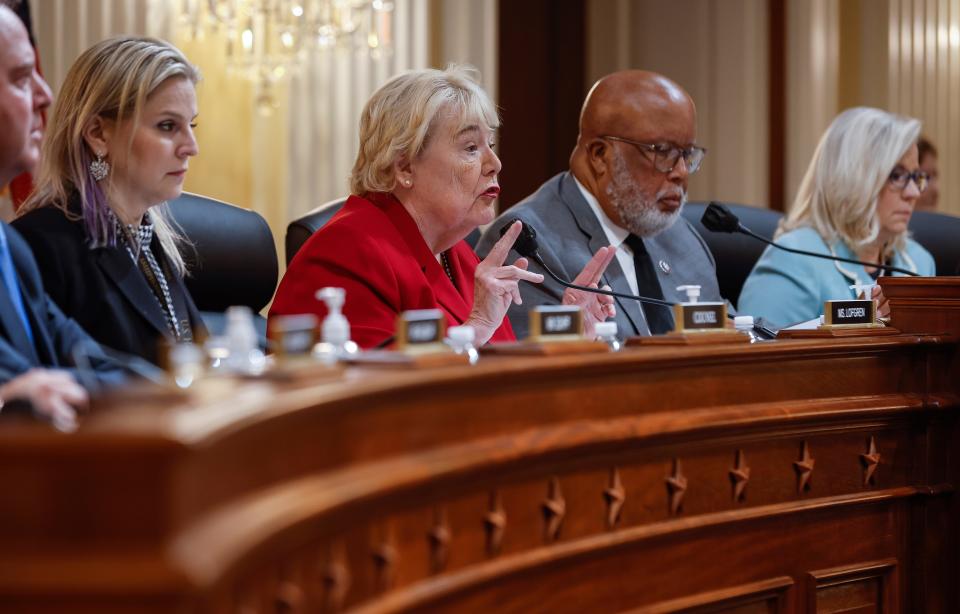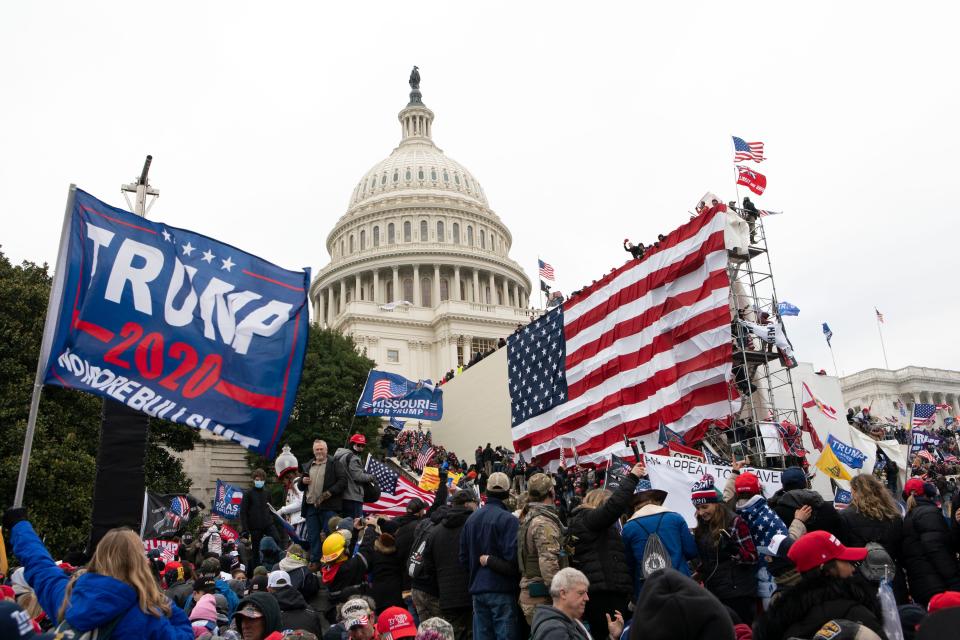House approves overhaul of vote counting law at heart of Trump attempt to overthrow 2020 election
- Oops!Something went wrong.Please try again later.
WASHINGTON – The House approved bipartisan legislation Wednesday to clarify how presidential Electoral College votes are tallied and challenged, aiming to prevent confusion and a repeat of the Capitol attack on Jan. 6, 2021.
The vote was 229-203, largely along party lines. Republicans largely opposed the bill as an attack on former President Donald Trump rather than a way to fix problems with the 1887 Electoral Count Act.
The House bill from Reps. Zoe Lofgren, D-Calif., and Liz Cheney, R-Wyo., must still be reconciled with the Senate version, which hasn’t been voted on yet.
"If your aim is to prevent future efforts to steal elections, I would respectfully suggest that conservatives should support this bill," Cheney said. "If instead your aim is to leave open the door for elections to be stolen in the future, you might decide not to support this or any other bill to address the Electoral Count Act."
Republicans who opposed the bill argued it was rushed to a vote without a committee hearing. Rep. Rodney Davis, R-Ill., said rioters who attacked the Capitol should be prosecuted. But Davis said Trump was justified in filing lawsuits challenging 2020 election results and lawmakers of both parties have challenged state electors over the years.
“The processes in place have worked," Davis said. “The Democrats are desperately trying to talk about their favorite subject, Donald Trump."
The White House issued a statement supporting the House bill.
"This bipartisan legislation seeks to improve the integrity of the process of appointing Presidential electors and of tallying those electors’ votes," the statement said.

Lawmakers are trying to clarify the Electoral Count Act because it was central to Trump’s strategy to overturn the 2020 election, which played out the same day as the Capitol attack. By law, Jan. 6 is when Congress is required to count Electoral College votes for president from the states, historically a tedious ceremony two months after the election.
Trump lawyer John Eastman proposed a strategy for his supporters in seven key states that President Biden won to send alternate slates of electors to Congress.
If those states flipped to Trump, Eastman argued he could potentially have won the election. If fake electors created enough confusion about a state’s results, Eastman argued Vice President Mike Pence single-handedly could have thrown the election to the House where GOP lawmakers could potentially have kept Trump as president because Republicans controlled a majority of state delegations.
But Pence refused to participate in the scheme, which is why rioters set up a gallows outside the Capitol and chanted “hang Mike Pence” as they rampaged through the building.
Michael Luttig, a retired federal appeals judge who is influential among conservatives and counseled Pence's aides before the attack, supported the House bill.
"Had this bill, the Presidential Election Reform Act, been the law during the 2020 presidential election, there never would have been the fateful January 6 that the country witnessed and experienced that day," Luttig tweeted Tuesday.

A federal judge ruled in a civil case that Trump and Eastman “more likely than not” acted unlawfully in the scheme. But neither has been charged.
Federal authorities and a Georgia prosecutor are investigating the fake electors for possible crimes.
Trump has denied wrongdoing. He said if his legal strategy wasn’t sound, Democrats wouldn’t try to change the law.
House Speaker Nancy Pelosi, D-Calif., said the insurrection that erupted at the Capitol on Jan. 6 sought to nullify the results of a free and fair election, so that it was an attack not just on the building, but on the Constitution.
"Now we have a solemn duty to ensure that future efforts to undermine elections cannot succeed," Pelosi said.
The House and Senate bills each affirm the vice president, as president of the Senate, has only ceremonial duties during the counting of electoral votes.
Current law allows a challenge to a state’s electors from just one lawmaker from each chamber, a threshold the House and Senate legislation aims to increase. Objections were raised Jan. 6 against electors from Arizona and Pennsylvania, but Congress rejected both challenges.
The House bill would require one-third of the lawmakers from each chamber to sign a challenge to state electors before it could be considered. The Senate version calls for 20% of each chamber to mount a challenge. A majority of each chamber would still be required to reject a state's electors.
“The bottom line is this: If you want to object to the vote, you better have your colleagues and the Constitution on your side," Lofgren said. "Don’t try to overturn our democracy."
More: A breakdown of the 187 minutes Trump was out of view on Jan. 6 as aides urged him to act
Another difference between the bills deals with extending voting in presidential elections in states that suffer "catastrophic" events. Rep. Jamie Raskin, D-Md., said current law allows state legislatures to appoint electors after a catastrophic event, which he argued was broad and dangerous.
“That very vague provision is dangerous – dangerously unclear – and it was targeted by former President Trump’s supporters in 2020," Raskin said. “This is an absolutely urgent and necessary update of the Electoral Count Act."
The House bill defines "catastrophic" events as those that prevent a substantial number of voters from casting ballots and would permit a state to prolong its voting period by five days. Such events include terrorist attacks, natural disasters or power outages, supporters say.
The House bill also would allow a presidential candidate to challenge a state's certification of electors in federal court. A three-judge District Court panel would hear the case and the Supreme Court would handle any expedited appeal.
But if the court found the candidate hadn't acted in good faith, the candidate's lawyers would be liable for paying three times the attorney's fees and other expenses from the court action, under the bill.

The House bill blamed Trump supporters for the Capitol attack in a section called "findings," a step the Senate bill didn't take.
"On January 6, 2021, a mob professing support for then-President Trump violently attacked the United States Capitol in an effort to prevent a Joint Session of Congress from certifying the electoral college votes designating Joseph R. Biden the 46th President of the United States," the House bill said. "The Electoral Count Act of 1887 should be amended to prevent other future unlawful efforts to overturn Presidential elections and to ensure future peaceful transfers of Presidential power."
This article originally appeared on USA TODAY: House votes to overhaul election law to prevent another Capitol attack
